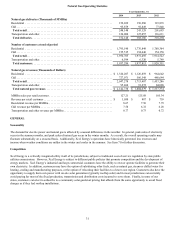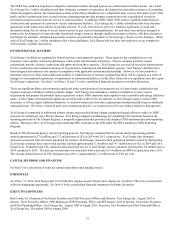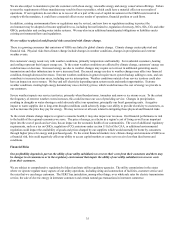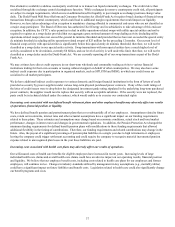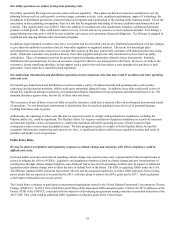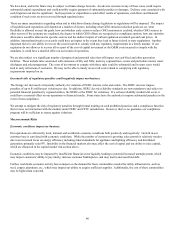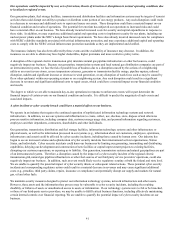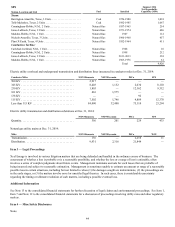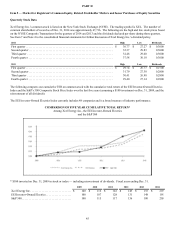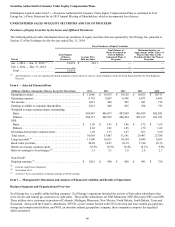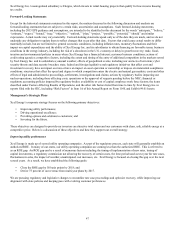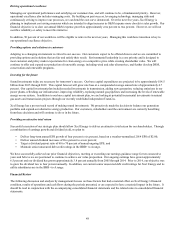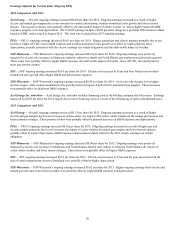Xcel Energy 2014 Annual Report Download - page 59
Download and view the complete annual report
Please find page 59 of the 2014 Xcel Energy annual report below. You can navigate through the pages in the report by either clicking on the pages listed below, or by using the keyword search tool below to find specific information within the annual report.41
Our operations could be impacted by war, acts of terrorism, threats of terrorism or disruptions in normal operating conditions due
to localized or regional events.
Our generation plants, fuel storage facilities, transmission and distribution facilities and information systems may be targets of terrorist
activities that could disrupt our ability to produce or distribute some portion of our energy products. Any such disruption could result
in a decrease in revenues and additional costs to repair and insure our assets. These disruptions could have a material impact on our
financial condition and results of operations. The potential for terrorism has subjected our operations to increased risks and could
have a material effect on our business. We have already incurred increased costs for security and capital expenditures in response to
these risks. In addition, we may experience additional capital and operating costs to implement security for our plants, including our
nuclear power plants under the NRC’s design basis threat requirements. We have also already incurred increased costs for compliance
with NERC reliability standards associated with critical infrastructure protection, and may experience additional capital and operating
costs to comply with the NERC critical infrastructure protection standards as they are implemented and clarified.
The insurance industry has also been affected by these events and the availability of insurance may decrease. In addition, the
insurance we are able to obtain may have higher deductibles, higher premiums and more restrictive policy terms.
A disruption of the regional electric transmission grid, interstate natural gas pipeline infrastructure or other fuel sources, could
negatively impact our business. Because our generation, transmission systems and local natural gas distribution companies are part of
an interconnected system, we face the risk of possible loss of business due to a disruption caused by the actions of a neighboring
utility or an event (severe storm, severe temperature extremes, generator or transmission facility outage, pipeline rupture, railroad
disruption, sudden and significant increase or decrease in wind generation, or any disruption of work force such as may be caused by
flu or other epidemic) within our operating systems or on a neighboring system. Any such disruption could result in a significant
decrease in revenues and significant additional costs to repair assets, which could have a material impact on our financial condition
and results.
The degree to which we are able to maintain day-to-day operations in response to unforeseen events will in part determine the
financial impact of certain events on our financial condition and results. It is difficult to predict the magnitude of such events and
associated impacts.
A cyber incident or cyber security breach could have a material effect on our business.
We operate in an industry that requires the continued operation of sophisticated information technology systems and network
infrastructure. In addition, we use our systems and infrastructure to create, collect, use, disclose, store, dispose of and otherwise
process sensitive information, including company data, customer energy usage data, and personal information regarding customers,
employees and their dependents, contractors, shareholders and other individuals.
Our generation, transmission, distribution and fuel storage facilities, information technology systems and other infrastructure or
physical assets, as well as the information processed in our systems (e.g., information about our customers, employees, operations,
infrastructure and assets) could be affected by cyber security incidents, including those caused by human error. Our industry has
begun to see an increased volume and sophistication of cyber security incidents from international activist organizations, Nation
States, and individuals. Cyber security incidents could harm our businesses by limiting our generating, transmitting and distributing
capabilities, delaying our development and construction of new facilities or capital improvement projects to existing facilities,
disrupting our customer operations, or exposing us to liability. Our generation, transmission systems and natural gas pipelines are part
of an interconnected system. Therefore, a disruption caused by the impact of a cyber security incident of the regional electric
transmission grid, natural gas pipeline infrastructure or other fuel sources of our third party service providers’ operations, could also
negatively impact our business. In addition, such an event would likely receive regulatory scrutiny at both the federal and state level.
We are unable to quantify the potential impact of cyber security threats or subsequent related actions. These potential cyber security
incidents and corresponding regulatory action could result in a material decrease in revenues and may cause significant additional
costs (e.g., penalties, third party claims, repairs, insurance or compliance) and potentially disrupt our supply and markets for natural
gas, oil and other fuels.
We maintain security measures designed to protect our information technology systems, network infrastructure and other assets.
However, these assets and the information they process may be vulnerable to cyber security incidents, including the resulting
disability, or failures of assets or unauthorized access to assets or information. If our technology systems were to fail or be breached,
or those of our third-party service providers, we may be unable to fulfill critical business functions, including effectively maintaining
certain internal controls over financial reporting. We are unable to quantify the potential impact of cyber security incidents on our
business.


